|
|
|
Sort Order |
|
|
|
Items / Page
|
|
|
|
|
|
|
| Srl | Item |
| 1 |
ID:
080778
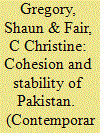

|
|
|
|
|
| Publication |
2008.
|
| Summary/Abstract |
Pakistan is becoming increasingly important in international security calculus, and the future trajectory of this nuclear weapons' state on the front line of the 'War on Terror' is of profound significance not only for South Asia but also for the international community. This article introduces an inaugural set of papers from the Pakistan Security Research Unit, established in 2007 at the University of Bradford, UK, focused on the cohesion and stability of Pakistan. The papers look at both the role of external players such as the United States and Afghanistan and at internal dynamics in Pakistan, with a particular emphasis on the role of the Pakistan military, on Kashmir and on jihadis (self-styled holy warriors) in the tribal belt.
|
|
|
|
|
|
|
|
|
|
|
|
|
|
|
|
| 2 |
ID:
080784
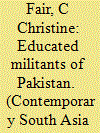

|
|
|
|
|
| Publication |
2008.
|
| Summary/Abstract |
This paper presents preliminary findings from a survey of 141 militant households in Pakistan, focusing on the background of slain militants in those households. The militants in the sample are well educated and are not predominantly emerging from Pakistan's religious seminaries as is often suggested. This essay considers Pakistan's policy options and constraints as Islamist militancy looms as Pakistan's single most important security concern. Given that militant groups in Pakistan have been state-sponsored actors, militancy will not go away until Pakistan makes a strategic decision to abandon the use of proxies as tools of foreign policy. However, in recent years, many of these once proxies have turned against the state. Effective policy measures to contain these groups are likely to elude the Pakistani Government, posing great risk to Pakistan, the region and the international community
|
|
|
|
|
|
|
|
|
|
|
|
|
|
|
|
| 3 |
ID:
080783
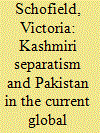

|
|
|
|
|
| Publication |
2008.
|
| Summary/Abstract |
The theme of this paper is to review the extent to which, in the post-9/11 environment, it became difficult for Pakistan to continue its covert support of the Kashmiri separatist movement at the same time as assisting the United States and its allies in the global 'War on Terror'. The paper will explain the origins of Pakistan's support and also examine the potential that the dispute between India and Pakistan over the state of Jammu and Kashmir still has to act as a de-stabilising factor in Pakistan and the region. The argument is that the Kashmir issue no longer has the same explosive characteristics it had 20 years or even 10 years ago, and that a genuine attempt has been made by the Pakistan government to curtail cross-border terrorism-although it has not been entirely successful, mainly because the militant groups have succeeded in establishing a momentum of their own. Yet, even after 60 years, there remains a general reluctance to let go of the Kashmir issue without some tangible political gain.
|
|
|
|
|
|
|
|
|
|
|
|
|
|
|
|
| 4 |
ID:
080779
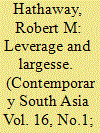

|
|
|
|
|
| Publication |
2008.
|
| Summary/Abstract |
Notwithstanding the close partnership between Washington and Islamabad that has developed over the past half-dozen years, Pakistan today is viewed by Americans as a country inimical to the interests and values of the United States. This article seeks to gauge the impact of Pakistan's close ties with Washington since 9/11. In important respects, the partnership has brought the government of Pervez Musharraf substantial benefits, including international legitimacy, the lifting of US sanctions, debt relief, access to sophisticated technology, a helpful American role in reducing tensions with India, and massive amounts of economic and military assistance. Yet the vast majority of the Pakistani people have an unfavourable view of the United States-in part because of its military engagements in Afghanistan and Iraq, but in good measure because the policies of the George W. Bush administration have served to sustain Musharraf's hold on political power. Desirous of avoiding contentious issues for fear of exacerbating Pakistani apprehensions of abandonment, the Bush administration has never spelled out at what point Pakistani misbehaviour would cause it to rethink the virtues of the blank cheque. As a consequence, it has failed to lay the groundwork for an enduring bilateral partnership once Musharraf has left the scene
|
|
|
|
|
|
|
|
|
|
|
|
|
|
|
|
| 5 |
ID:
080780


|
|
|
|
|
| Publication |
2008.
|
| Summary/Abstract |
Pakistan's Afghan policies, so consequential for its neighbour, have also had a deep impact on the country's political landscape and society. This article examines how Pakistan has pursued a two-track foreign policy toward Afghanistan that often encompasses incompatible goals. Pakistan's leaders have also frequently ignored the long-term and wider implications of their policies domestically and regionally. The discussion looks at the consequences of Afghan policies for Pakistan's national identity and social cohesion. The means by which Islamabad governments have dealt with the challenge of Pashtun nationalism and its contribution to the development of ethnic assertiveness and Islamic radicalism are next examined. The article then describes the role of Afghan policies in transforming Pakistan's border regions with Afghanistan and the wider implications for the state's legitimacy and authority. It also points out the Pakistan Government's ambivalence in its relationship toward militant extremists. A subsequent section considers the costs and rewards of Pakistan's Afghan policies internationally; and Pakistan's strategic partnership with the United States, including its impact on the domestic economy and public attitudes, receives particular attention. Finally, the article recognises that, while Pakistan's politics have entered a transitional stage, its Afghan policies are likely to continue to affect ethnic fissures, religious radicalism, and the legitimate authority of the state.
|
|
|
|
|
|
|
|
|
|
|
|
|
|
|
|
| 6 |
ID:
080782


|
|
|
|
|
| Publication |
2008.
|
| Summary/Abstract |
For many years, conventional wisdom stressed that developing countries such as Pakistan face a guns versus butter trade-off, with increased defence expenditures coming at the expense of improved economic growth. Later, statistical studies suggested that, depending on the circumstances, defence expenditures could either aid or hinder economic growth. However, these studies were silent on the key role governance structures played in affecting the environments in which defence expenditures occur. Our findings suggest that governance patterns relative to defence determine to a large extent whether increased defence allocations interact with the economy in a positive or negative fashion. Unfortunately for Pakistan, defence expenditures have outrun governance to the extent that their impacts on the economy are negative. Furthermore, this effect is likely to persist even if defence expenditures are significantly reduced. Improved governance is the only option open to the authorities in their attempts to neutralise the adverse impacts of military expenditures
|
|
|
|
|
|
|
|
|
|
|
|
|
|
|
|
| 7 |
ID:
080781
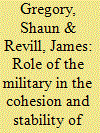

|
|
|
|
|
| Publication |
2008.
|
| Summary/Abstract |
The Pakistan military has long been considered the one institution in the country that functions sufficiently well to deliver international objectives. It has consequently been the partner of choice for many states, not least the United States. A reading of the history of Pakistan, however, shows that successive military regimes have each led Pakistan into crisis, to the detriment of partners' interests; and far from guaranteeing the cohesion and stability of Pakistan, military rule has more often imperilled it. This article offers an assessment of military rule under General Pervez Musharraf and argues that the unprecedented support offered to Musharraf by the United States, both in material terms and in terms of the political space afforded him, has brought Pakistan once again to the brink of disaster. The lessons are clear: the United States, and the West more generally, needs to place support for democracy and justice in Pakistan above support for narrow conceptions of order, and needs to privilege support for the people of Pakistan over that of support for Pakistan's military government
|
|
|
|
|
|
|
|
|
|
|
|
|
|
|
|
|
|
|
|
|